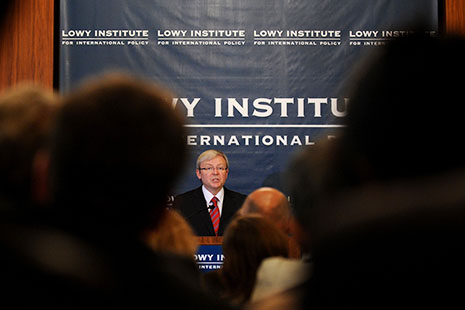IS IT POSSIBLE to have an informed and rational debate about climate change in an age of ever-churning news cycles? The question is unavoidable after the media treatment of a key speech on climate change given by Kevin Rudd last Friday at the Lowy Institute for International Policy. Mr Rudd’s speech was a complex and comprehensive statement of government policy on climate change. It combined political polemics, scientific argument and policy prescription. It was a speech that demanded to be taken seriously by the media and by supporters and opponents of the government’s climate change policy.
Yet it already it seems to have been forgotten in the onward rush of “news.” What might reasonably have been treated as a serious contribution to the debate over the potentially existential threat of climate change was given extremely short shrift in the media and then flicked to oblivion.
Here, briefly, is the sequence. Mr Rudd’s speech to the Lowy Institute was originally advertised as an address on “Australia, the region and the world: the challenges ahead.” Perhaps not surprisingly, he decided to deliver a speech on climate change, noting that a Senate vote on the government’s cap and trade scheme was only twenty days away and the Copenhagen conference only a month off.
The speech was a detailed critique of inaction. Mr Rudd said opponents of tough action on climate change were “betting the house on that simple premise that the cost of not acting is nothing.” He went on: “They are reckless gamblers who are betting all our futures on their arrogant assumption that their intuitions should triumph over the evidence… The logic of these skeptics belongs in a casino, not a science lab, and not in the ranks of any responsible government.”
The weekend media response was to reduce the speech to the familiar clichés of political conflict. Some examples:
• Sydney Morning Herald, Climate War Gets Personal for Rudd: “Kevin Rudd as launched a blistering attack…”
• Australian, Rudd Dares Turnbull on ETS: “Kevin Rudd has savaged climate change sceptics…”
• Canberra Times, Rudd Feels Climate is Ripe to Take Gloves Off: “Prime Minister Kevin Rudd has launched a savage attack…”
All fair enough, but newspaper readers were given none of the detail of Mr Rudd’s argument. They were left with the impression that the prime minister had only criticised his opponents when in fact he did much more. Every report combined instant interpretation (“savage attack”) with one-line reactions from Mr Rudd’s opponents. None of the reports did justice either to the speech or to alternative views. The Australian in particular appeared to reassert the view that climate change is a conspiracy of myth and exaggeration being perpetrated by some sort of global green Taliban movement of economy-wreckers.
Within hours the news cycle had turned. By Saturday morning the ABC website was reporting what cross-bench and opposition senators were saying about the prime minister’s “hissy fit.” In this report, Rudd’s speech was reduced to one sentence and readers were given only the reaction of some of the people criticised by Rudd.
By Monday the whole thing appeared to have been forgotten. There were some references to the political controversy between the government and opposition and within the opposition; there were some references to difficulties confronting the Copenhagen conference. But the prime minister’s seminal contribution to the debate, delivered at a respected private think tank, was merely an archived document reduced by the media to an “attack.”
It was a dismal effort. A half-decent media response would have reported at least a reasonable summary of what the prime minister said. And it might have addressed some questions raised by Mr Rudd’s remarks. Assuming the reality of climate change, how consistent is government policy with the prime minister’s seemingly apocalyptic rhetoric about non-action on climate change? How significantly are industry and environmental pressure groups influencing climate change policy? What is the next step if, as now seems accepted, Copenhagen cannot finalise an agreement on financing the carbon reduction programs of developing countries? Can countries like Australia ethically outsource greenhouse gas reductions by purchasing carbon credits from developing countries?
Regrettably the media gatekeepers increasingly assume that few people care about these sorts of questions in the age in which every political event is reduced to attack and defence. In Canberra last weekend the great terror headline was “ACT babies exposed to TB.” Other national papers terrorised readers with asylum-seekers and the homeless.
Compared with these issues climate change is a difficult long-run issue. How are we balance the long-term habitability of the entire planet with the short-term economic wellbeing of parts of the planet? Is Kevin Rudd’s political approach to the question really consistent and credible? On these and other questions, don’t expect too much serious information or guidance from the media. •




